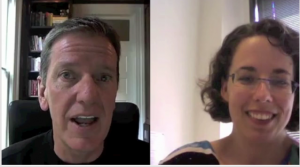Jane Friedman's Blog: Jane Friedman, page 206
September 1, 2011
Writing on the Ether

Porter Anderson
I am thrilled to introduce a new weekly feature, Writing on the Ether, by former CNN journalist Porter Anderson. Writing on the Ether will round up some of the best and timeliest articles related to writing and publishing that you don't want to miss.
Porter has been well-known to me since 2010 as one of the most dedicated Twitter feeders of great online articles for writers. When he began introducing me to fabulous stuff I had never seen, I knew he deserved a dedicated column. So here he is! (For those paying attention, this feature takes the place of my old series, Best Tweets for Writers.)
This week's how-to and how-not-to
"An 'authentic following' comes down to this: Twitter doesn't work without followers who actually read your tweets."
—Nina Badzin's two-parter at Writer Unboxed: The Art & Science of Twitter
(Part 1: The Science & Part 2: The Art)
The harkening and who knew?
"There's a cool 'read aloud' feature on the device that allows the Kindle to read to me."
—Elizabeth S. Craig on listening to her character dialogue: Writing to Read Aloud
The horrors and the hand-wringing
"Failure to pay attention to what we can control as authors, and what we can't, leads to a form of cargo-cult neuroses in writers."
—Tobias Buckell on who's the real pigeon here, anyway? Writers and Pellets
The headstrong and the honest
"All writers, whether they're among the fortunate ones who have a publisher pushing them or whether they're trying to do it themselves, should be grateful that publishers are doing their damnedest to maintain prices and the perception of value for writers' work."
—Mike Shatzkin, in a crystal clear argument:
Writers Who Oppose Agency Pricing Aren't Acting in Their Own Self-Interest
The heartfelt and the hawking
"Kindle's going to save me, right? I'm going to make all my new works direct-to-market digital, and I'm going to get rich two bucks at a time, right? Right?"
—John Vorhaus, in a bravely forthright, intelligent meditation:
I Think My Model Is Breaking Down
The hunker-down I want more of
"I'm learning from you guys. The trend surprises me: most of you seem willing to take snark, condescension and find something useful in it."
—agent Jason Ashlock (Movable Type Literary Group)
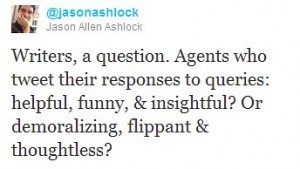 Ashlock was leading an impromptu chat with writers and some agents—about literary agents' Twitter patterns. Strictly in general terms. No names. In any business, tweeting on your professional account involves the potential both for prudent communication and for other things. On Monday evening, the term "snark" probably would have dominated a word cloud from the chat. But Ashlock is a gentleman.
Ashlock was leading an impromptu chat with writers and some agents—about literary agents' Twitter patterns. Strictly in general terms. No names. In any business, tweeting on your professional account involves the potential both for prudent communication and for other things. On Monday evening, the term "snark" probably would have dominated a word cloud from the chat. But Ashlock is a gentleman.
"Let's commit to steering our community's conversations toward the productive and instructive," he tweeted. "I'm … pretty impressed with the unflappable spirits & undaunted efforts of these writers."
I think we could benefit from hearing more on this topic, in the constructive context Ashlock brought to the table. Are there any author-clients who have been surprised at the tone and substance of their agents' tweets? And are there agents who'd like me to just get on to the next item? OK, I will.
The hope—collaboration?
"I worry about the day pilots decide they've got pilots' block and planes start dropping out of the sky. Try telling your boss you've got 'day-job block' and see where that gets you."
—Author Mark Williams guesting for David Gaughran in Stockholm:
Urban Writing Myths and the New Renaissance
("Writing, a lonely profession? Be serious.")
The huh?—what was this "publishing" thing, again?
"What we thought publishing was, was not in fact what publishing was. It's not what writers and readers needed."
—Richard Nash to Boston Review's Matt Runkle on Revaluing the Book
And the hype for which he has hankered
"Timothy Ferriss' first book, The 4-Hour Workweek, was turned down by twenty-six publishers before being accepted by Crown … it's easy to understand the caution of those twenty-six."
—Rebecca Mead, on the news that Amazon will publish The Four-Hour Chef (Ferriss' new book):
Better, Faster, Stronger
This is a long, deep New Yorker (Sept. 5 issue) weekend read to bookmark. Watch for Mead's mightiest moment: "Every generation gets the self-help guru that it deserves."
Porter Anderson is a Fellow with the National Critics Institute, and a senior producer and consultant formerly with the United Nations World Food Programme in Rome and INDEX: Design to Improve Life in Copenhagen. As a journalist, he has worked with media including CNN, the Village Voice, and the Dallas Times Herald. He's based in Tampa.
August 31, 2011
Are You an Impatient Writer Who Burns Out?
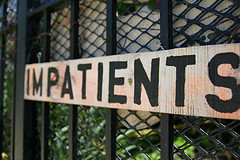
by Zach Duffy
Recently, I was a featured guest interviewee over at Curiosity Quills. They asked me some challenging questions about publishing and the future of authorship. Here's a small snippet:
People are impatient and they want to see results very quickly. There's a lot of emphasis on quantity—quantity of friends or followers or fans or viewers—rather than quality, and John Locke to some extent was able to look at both and make some very good choices. He was very focused on who he was trying to reach. He understood what they would respond to, and he spent his time and energy on the places he saw a quantifiable return.
On the other hand, he was doing things that were authentic. So I think even though online media and social media can present this opportunity for a lot of noise and meaningless messages, those who are able to approach this in a more personal way are the ones who win out. It can't be done without a strategy behind it—but not everyone hits on the right strategy at first. They tend to burn out before they get it right.
Click here to read the full interview, where I also discuss which social networks you should participate on, how the role of traditional publishers are changing, and how indie publishers can stand a chance in the marketplace.

August 30, 2011
How to Waste Your Time on Social Media

by Sepehr Ehsani
Last week, I discussed how you can waste your time trying to get published.
You can also waste your time on social media, which I discussed over at Writer Unboxed on Friday, in case you missed it. Here's a small snippet:
No amount of expert marketing can make a poor or mediocre product sell—or gain visibility—like a great one. If what you have doesn't meet the standards of your readers, you'll be struggling each and every day to spread word of mouth because people don't truly believe in your work.
Click here to read the full post.

August 29, 2011
Hello to Visitors From Michael Hyatt's Blog!
Today, Michael Hyatt is featuring a 12-minute interview with me on his blog. We talk about the following:
How important is an author's "platform" to their success in the publishing world?
Do you think there is still a role for traditional publishers in the future?
What are the best practices of really successful writers?
What is the role of consistency in writing and publishing?
What do writers sometimes do to sabotage their careers?
For those of you new to my site, who came here from the Michael Hyatt interview, welcome! Here are a few things you might enjoy:
My writing advice archive: the best of my advice from There Are No Rules (my Writer's Digest blog, which is no longer active)
Draft Your Platform Action Plan: 5 Worksheets
Get Started Guide: Blogging for Writers
3 Principles for Facebook Fan Pages
How Much Has Book Marketing Changed Since 2005?
The Basic Pitch Formula for Novelists
If you like the advice you find, you might also like my monthly (or so) e-newsletter.
Thanks for visiting!

When Mom Was My Age (#43)
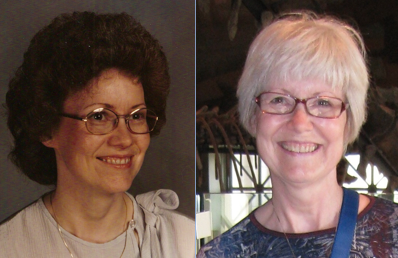
Margaret Jensen (1984 & 2011)
"When Mom Was My Age" is an interview series between daughters and mothers. New interviews appear every Monday. If you would like to participate, contact Jane.
The following interview is with Margaret Jensen (age 63), reflecting on her life at age 36, interviewed by daughter Megg Jensen.
From Megg
Before I e-mailed Jane about appearing in this series, I called my mom and asked her permission first. I thought she'd say no. Surprisingly, she agreed. My maternal great-grandmother wrote a book about her life and my maternal grandfather wrote one about his World War II experiences. Mom always says her life is dull compared to theirs, but I wanted to participate in this series to show her she's anything but boring.
In 1984, you were 36. Where did you live?
On a farm outside a very small town. The house had been in your father's family for nearly 100 years at that time. It was built by his ancestors and the family has always farmed the land. We had one bathroom, one TV, and no dishwasher. [laughs] It's still the same now.
What did you do for work and what was your typical day like?
I was, and still am, the library aide in the local elementary school. My day was always busy, but fun, and never, ever boring in a K-8 building. It really wasn't work to me. It had been a dream of mine since I was a kid to work in a library. My dream came true. In 1984 I'd only been working for two years. It was a huge change to adjust to working, but my job gave me confidence I didn't know I had.
What did you worry about most?
I worried about raising you kids right. As farmers, I worried a lot about the money and making it stretch for your sister who was getting ready to go to college and your brother who wasn't far behind. I worried all the time about work and whether I was giving you enough attention since I'd been home for your brother and sister, but not for you. I was so grateful we had all the same days off of school.
What did you think the future held for you?
To tell the truth, I just hoped to be able to work at that job until I couldn't or didn't want to. I hoped things wouldn't change much. The older kids were getting ready for college and I did worry a lot about them coming from a small farming community and adjusting to life in the big world out there. That's a mom's job. I worried about you being lonely. I never thought a lot about the future for myself—mostly just for my kids.
How do you feel when you look back on yourself at 36?
I think I was naive. I saw things rather simplistically. I looked to each day and couldn't fathom what would happen as I got older. How did I get to be this old? I don't understand how life went so fast from 36 to 63. I turned around and it was all gone. But I still feel like I'm young and I know sometimes I act like it too. I think my grandkids and the kids at my job keep me young.
From Megg
While interviewing my mom, I was struck by how much she worried about my siblings and me succeeding. She obviously had nothing to worry about since my sister is a VP in a large hospital system, my brother is a partner at one of the world's largest accounting firms, and I'm deliriously happy writing. Back then, she always seemed calm and easygoing to me—not at all concerned. I always looked at her life as one that dreams are made of. Maybe my mom never wanted to be a famous actress, or even the PTA president, but she found a job that she loved. She lead by example, which to me, is the best way to be a great mom. (Megg Jensen is a pen name—I think you can guess who I named my novelist self after.)

August 27, 2011
Reading Notebook #33: Enlightenment (and Love) Taste of Freedom
From "How to Know It's Real Love" by Martha Beck, in Oprah magazine.
Buddha once said that just as we can know the ocean because it always tastes of salt, we can recognize enlightenment because it always tastes of freedom. There's no essential difference between real love and enlightenment. While many people see commitment as a trap, its healthy versions actually free both lovers, bring out the flavor of their true selves, and build a love that is satisfying, lasting, and altogether delicious.
A nice companion piece, also by Martha Beck: "How to Love More By Caring Less" (very Buddhist in its approach as well).

August 26, 2011
The Myth of the Lone Creative Genius
Today's post is an excerpt from the recently published Birth Your Book! by Dr. Liz Alexander. Find out more about Liz at the end of this post.
Where did the myth of the lone creative genius come from? You know, the idea that a writer must sit alone in the garret awaiting his or her muse for inspiration, with little more than a bottle and recreational drugs for company?
The truth is creativity is a collaborative act achieved largely by highly social, stable individuals. We like to think of the famous inventor, Thomas Edison, as being the only person to have dreamed up the thousands of patents and inventions that are attributed to him. It's not widely appreciated that among Edison's contributions was the first known research and development (R&D) laboratory. Edison may have provided the environment, the persistence and much of the inspiration, but it was his unsung employees whose combined efforts helped to discover and develop the ideas we consider to be solely Edison's.
The likes of Einstein, Bohr, Heisenberg, Pauli, Planck, and other geniuses within the scientific community certainly spent many hours alone conducting thought experiments, but they knew the value of meeting to share and debate their postulations about quantum theory and the nature of reality.
When you want to generate creative ideas, there is a huge advantage in cross-pollinating different perspectives, disciplines and approaches in a mutually respectful, open-minded environment.
Authors are part of a creative community. When I wrote each of my four books for Gaia Books, for example, I had to work up a draft proposal for the commissioning editor. I would then collaborate with him to produce a final proposal document that needed overall editorial approval before I could begin writing. I'd then work with a designated editor who would critique each chapter as I wrote it, making changes to tighten and improve the work. We'd team up with a designer (these books had extremely high production values, with beautiful artwork and illustrations throughout) until the finished book read and looked as perfect as we could get it.
Read the acknowledgements page of any work of fiction or nonfiction to discover just how many people played a part in that writer's life. Similarly, when I worked as a freelance journalist, most of my articles—although well written and meeting the scope of the commission—were "red-penned" because the magazine editors knew their readers better than I did. Their job was to improve upon my article, which they did, although it was always my name that was credited.
It's true that many writers, including myself, like to get away from it all once in a while, spending weeks and sometimes months closeted away from the outside world. But that is mainly for practical reasons, such as being able to write without the day-to-day distractions.
Writing does not have to feel lonely or be anti-social. On the contrary, good writers need to be fully involved with the world. As Tom Wolfe once said,"The author should be out in the field the same as the reporter, living, observing and experiencing life."
Learn from and work with individuals who are ahead of you professionally and who can provide the scaffolding you need to stretch yourself beyond those capabilities you could achieve by yourself. Find people who can provide you with the necessary motivation and support to make you feel part of a successful team.
This is particularly important if you are taking the self-publishing route where there are fewer quality controls. Under these circumstances you have no editors or other publishing professionals helping you determine the scope of your book, how best to structure it, to critique your writing style, and ensure that the end product enhances rather than detracts from your professional reputation and credibility.
I like to think of it this way: When I want to look really good, I go to a professional hairstylist; I wouldn't dream of cutting my hair myself! Despite all the software packages available, I prefer to trust a CPA who knows all the tax regulations and loopholes to complete my tax returns and give me that peace of mind. When I realized I needed a website that was an income generator and not just an online brochure, I worked with a professional who could help me understand and apply the relevant web tools and analytics.
There are some things that can be accomplished alone, but writing a book should not be one of them. If you are trying to publish a book, the more professional, experienced and credentialed minds and eyes that can assist you in the birth of that book, the greater its likely impact on your readers.
 Books (both reading and writing them) are the passion of Dr. Liz Alexander. She is the author of ten commercially published nonfiction books. Collectively, these titles have reached close to half a million readers worldwide. Now committed to indie publishing, Birth Your Book! is her first e-book.
Dr. Alexander works one-one-one with aspiring authors, businesses, and not-for-profit groups. Click here to find out more about her and her services.
Books (both reading and writing them) are the passion of Dr. Liz Alexander. She is the author of ten commercially published nonfiction books. Collectively, these titles have reached close to half a million readers worldwide. Now committed to indie publishing, Birth Your Book! is her first e-book.
Dr. Alexander works one-one-one with aspiring authors, businesses, and not-for-profit groups. Click here to find out more about her and her services.

August 25, 2011
To Learn About Your Readers, You Need a Site
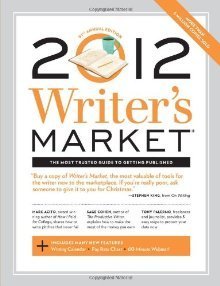
2012 Writer's Market
In the newest edition of Writer's Market (and Writer's Market Deluxe), there's a featured interview with me, where I discuss the future of publishing, websites and blogging, and Twitter strategy. Here's a brief snippet:
Your personal website is impressive, incorporating your blogging, tweets, an e-mail newsletter sign up and more. What do you see as the purpose or function of your website for you?
It's the place online that's totally mine. I own it, I decide what happens there, and it collects everything I do in one central place. It has the most comprehensive information about who I am and what I do. No matter where else I am active online (social media, community sites, e-mail, etc.), I always point back to my website so people can find out more and stay in touch by whatever means they prefer.
All serious writers need this kind of hub so they can start learning more about their readers and formalizing a connection with them. Facebook, Twitter, and other sites help you find readers and connect, but those connections can disappear at any moment, or gradually over time. Having your own site gives you more control and insight into your connections, how people are finding you, and why people find you.
Did you launch your current site through your own devices, hire a professional, or through some other means?
I did everything myself. I bought my own domain (JaneFriedman.com) and hosting through GoDaddy. I installed WordPress on my site, then bought a premium WordPress theme that looks great without any customization.
I've used WordPress for many years, so it wasn't difficult to get started with it. I prefer WordPress because it's free (open source), continually improved and updated, and has amazing support and features because of the huge community that's developed around it. I also love WordPress because it's a content management system (as opposed to site design software), so it's easy to add loads of content and media without having to know any coding. Just about anyone with a computer and Internet access can do what I did in one (long) evening after watching a few simple online tutorials.
I have thought about hiring a web design professional to kick my site design up a notch—to add some personal style—but I'm more concerned with function and substance right now.
If you could only pass on one piece of advice to writers who are seeking to "make a career" out of writing, what would it be?
Think beyond the printed page; think beyond the book. There are so many wonderful, unique ways to deliver a story or spread a message, but we often limit ourselves to thinking of the way it's always been done. It's more possible (and more fun) than ever to make an impact outside of the traditional publishing options. So, think more deeply about who your audience is and how you are most likely to reach them. Think about blog posts, e-newsletters, podcasts, videos, and Twitter accounts. Think about online community sites. Think about personalized experiences. Not every piece of material or content really deserves or needs to appear in print or in a traditionally edited publication. That's not what grants authority any longer. Instead, it's about how you can beautifully match your content or story to the right medium so that it perfectly serves the needs of your audience.
Many thanks to Writer's Market editor Robert Brewer for the excellent interview!

August 24, 2011
Get Started Guide: Blogging for Writers
This post is for writers totally new to blogging, about to start a blog, and/or feeling dissatisfied with their current blog.
Questions to Ask Before You Start
What will distinguish your blog? What's your unique angle? Most successful blogs have a very specific angle, topic, or audience. This makes it easier to attract attention and build a community around common interests or perspectives.
Your blog is a body of work, like anything else you might create. And here, I'm going to steal questions right from a talk that Dan Blank gave at the Writer's Digest Conference. Don't think: "I'm going to create blog (a thing)." Ask: What is my purpose? What are my goals?
The more time you spend blogging, the more value you build for readers over time and the more they find you. Your efforts will snowball. The only problem: You have to be patient. Are you willing to commit to blogging for more than a year? (It took me about 18 months before my blog was really going somewhere. It took that long to find my voice and the niche that I felt most strongly about, where I believed I had a unique contribution to make.)
Ideally, before you start a blog, you think about who'll send you traffic. Identify the notable community players, the people who you'll build relationships with.
Key Components of Your Blog
Aside from the blog posts themselves, you should also have the following:
Header/banner + tagline. It should be clear to new visitors what your blog is about and what they're going to get from it.
About page or bio. If your blog does its job, people want to know more about the person behind the writing. Don't make them search for this. I recommend creating a separate and detailed page that also includes contact information.
Calendar or archive. People new to your blog may want to dig around in your older posts. Make it easy for them to do so. Sometimes it's helpful to create a sidebar that tells readers what your most popular posts are.
Comment functionality. Your blog will grow, and you'll build relationships, through an easy-to-use comment system. Most major blog platforms (like WordPress) can help you streamline your comment system to automatically eliminate spam activity. (I recommend a combination of Disqus and Akismet if you're hosting your own site.)
Sharing functionality. Make it easy for people to share your posts on Facebook, Twitter (or just about anywhere else) through plug-ins like AddThis.
Readability. If your blog or site is meant to primarily be read, then don't hamper readability by making the text too small, too tight or (worst of the worst) white type on a black background. Be aware that a lot of pop-ups, ads, or bad layout can also hamper readability and drive readers elsewhere.
For Each Post: Go Through This Checklist
Improve your headline. If people saw ONLY the headline (like on Twitter), would they feel compelled to click on it? Is it specific? Is it intriguing or provocative? Does it offer a benefit? Is it timely or relevant? Why will people click on the headline? Remember, that's often the only thing people see when they're surfing online and looking at search results.
Improve your readability. Consider adding more paragraph breaks (one-line paragraphs are acceptable), bulleted lists or numbered lists, images, subheads, quotes—whatever it takes to make your posts more scannable. Reading online is not the same as reading offline. If your post is very long, consider breaking it up into a series. Or, make it simple for people to save the post, print the post, or otherwise consume it offline. [This "rule" gets broken all the time successfully, but it requires the right readership and great content, among other things.]
Improve discoverability. Make sure each post is categorized and tagged, at minimum. If your blog platform allows for it, adjust what title, description, and keywords are attached to your post for search engine optimization (SEO).
To Grow Your Readership
Update consistently and on a regular schedule.
Frequently link to relevant blogs, resources, and sites.
Try out a series or weekly feature.
Interview people who interest you. Run Q&As.
Comment on blogs/sites that have some relevance to your own blog.
Allow readers to sign up for e-mail or RSS delivery of your posts. (Try Feedburner if this functionality is not already baked into your site.)
Always post links to each new post on your Facebook page, Twitter, etc.
Offer to guest blog for others. Provide them with even better content than usual.
Be patient.
The No. 1 Rule to Grow Readership
Offer great content. Period. Check this post for a wake-up call on all the advice I've just offered you: Are Blog Best Practices Bullshit?
Where You Can Start a Blog for Free
My top recommendation: WordPress. You can use WordPress.com (with limited functionality) for free. When you're ready to have your own URL/site, you can install the WordPress content management system onto your site, and seamlessly import your WordPress.com content.
Tumblr. Great for curating stuff from elsewhere online. Excellent for visuals and multimedia. Here's my Tumblr blog.
Blogger. Owned by Google and still very popular.
Posterous. Particularly good for group blogs and user-generated content/posts (though WordPress has advanced functionality in this regard, too).
If You're Starting With WordPress
Here are my technical tutorials on starting a WordPress.com blog. It is a VERY basic, step-by-step instruction process for people who are completely unfamiliar with WordPress. I created this step-by-step for my university students, who sometimes have trouble figuring out how to change key settings in WordPress.
Sign up for a WordPress.com blog
Change basic settings
Change the appearance (themes)
Make your first post
Add widgets to your sidebar
Additional Advice & Resources That I Love
The Secret Ingredient to an Irresistible Blog (from Copyblogger)
4 Foundations of a Successful Blog (from ProBlogger)
23 Essential Elements of Shareable Blog Posts (from Chris Brogan)
The 120 Day Wonder: How to Evangelize a Blog (from Guy Kawasaki)
10 Ways to Create a Better About Page for Your Blog (from Michael Hyatt)
How to Grow Traffic to Your Blog (from Chris Brogan)
One Simple Way to Generate More Comments on Your Blog (from Copyblogger)
How I Sold My Blog for $20,000 in 8 Months (from Blog Tyrant)
If you'd like an extended version of the advice in this post (plus elaboration on how to create a self-hosted WordPress site), then download my PDF handout, Blogging 101.

August 23, 2011
I Am Always Sincere, But Never Serious
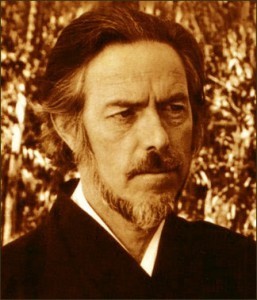
Alan Watts
I am always sincere, but never serious.
—Alan Watts
When I started my first professional blog, I struggled to give it a name. While I thought I could offer helpful information, the truth about writing advice is that it's only helpful if you're the kind of writer who benefits from it. Not all writers do (or can). Plus there are always exceptions to each piece of advice.
That's why I ended up calling the blog There Are No Rules. (I've made an archive of the best posts—click here.)
My hope was that even if people read a lot of my prescriptive advice, the name of the blog itself would offer a meta-commentary—or a wink and a nod—that I'm playing the advice game, and you're allowing me to play the game by listening and granting me some kind of authority.
A personal anecdote: I grew up in a family that didn't crack many jokes. In fact, I was always afraid of people making jokes around me, because I was the sort of person who easily served as the target. (I was the biggest nerd in school.) I hesitate to say I grew up humorless, but it took a while before I knew how to relax. This dynamic still comes into play when I'm among strangers. Since my default is sincerity, especially in unfamiliar situations, I also take everything said as sincere, and sometimes I realize a few seconds too late that what I'm hearing is a joke. There are times when people even have to explicitly state—upon seeing the reaction on my face—"I'm joking."
I'm afraid this can make me very dull at parties. I'm sincere to a fault.
However, I am not serious, and the Alan Watts quote above is one of my very favorites. Every once in a while I like to remind people: Know that I'm sincere, but never serious. Forge your own path; write your own rules.

Jane Friedman
- Jane Friedman's profile
- 1882 followers


